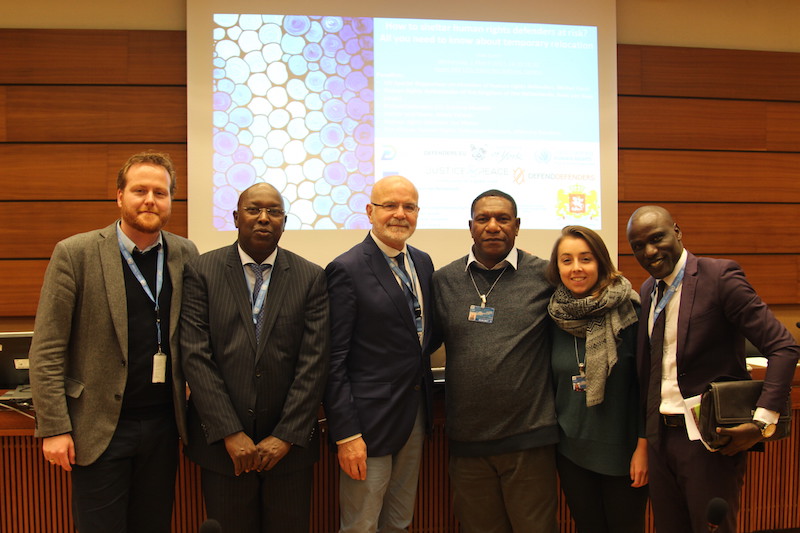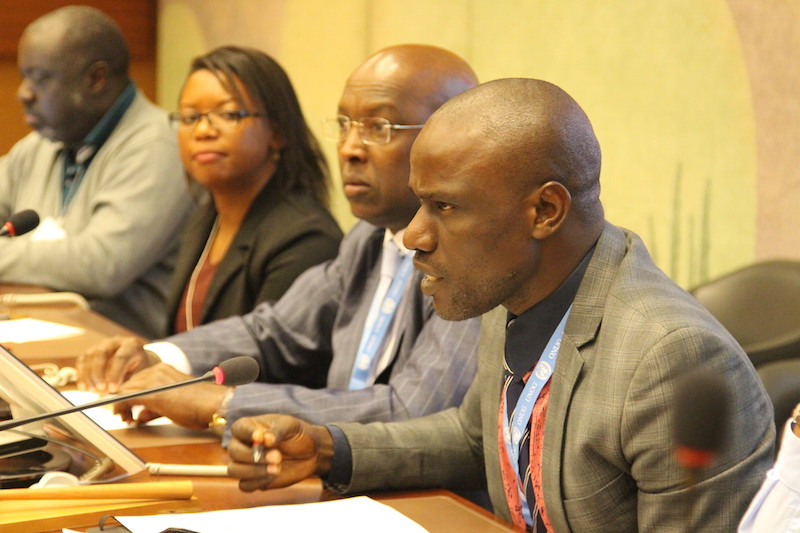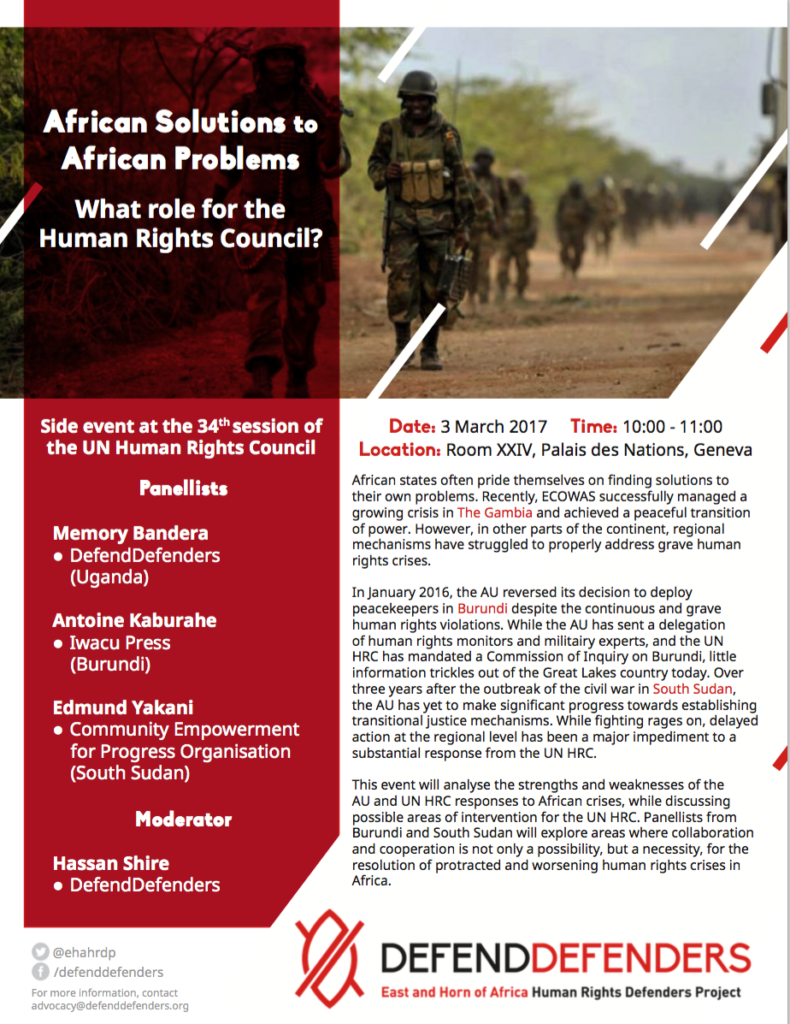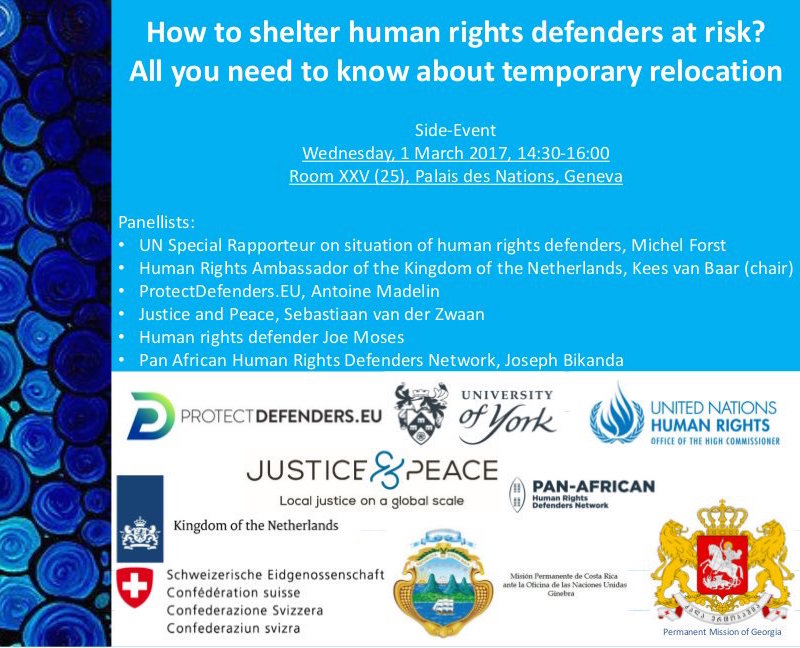During his opening remarks at the 34th session of the UN Human Rights Council (UN HRC) Secretary General António Guterres thanked human rights defenders (HRDs) for their courage and made them a promise: “The United Nations is on your side. And I am on your side.” Although the DefendDefenders (the East and Horn of Africa Human Rights Defenders) delegation comprising of HRDs from Burundi, Ethiopia and Uganda welcomed these strong words of support, we also worked hard to advocate for concrete action to see that support is fully realised on the ground.
As his first term as UN Special Rapporteur on the situation of HRDs came to an end, Michel Forst voiced his concern about the growing number of attacks worldwide intended to undermine the role of HRDs – a trend to which the East and Horn of Africa sub-region has been no exception. Considering Mr. Forst’s observation that “the incidents in question are not isolated acts but concerted attacks against those who try to embody the ideal of the Universal Declaration of Human Rights in a world free from fear and want,” it is essential that strong advocacy for the protection of HRDs continues. We therefore welcome the Council’s decision to renew his mandate by another three years.
Meanwhile, the human rights situation in South Sudan has taken on new urgency since July 2016 when troops loyal to the government and opposition clashed in Juba . Ahead of the 34th session of the UN HRC, DefendDefenders coordinated a joint civil society letter signed by 39 civil society organisations urging the Council to renew and strengthen the mandate of the Commission on Human Rights in South Sudan.
With little action taken by the African Union to move forward with the Hybrid Court, a key element of the 2015 Peace Agreement to ensure accountability for grave crimes committed during the civil war, the Commission can play an essential role in preserving evidence and documenting violations for future prosecution. We are encouraged that the UNHRC adopted a resolution to broaden the mandate in an important step toward justice, reconciliation, and ultimately peace.




Despite being a member state of the UN HRC, the Burundian government continues to flaunt its obligations to cooperate with Council mechanisms with its persistent refusal to engage with the Commission of Inquiry on Burundi. Since April 2015, when President Nkurunziza’s decision to seek a third term in office sparked the current crisis, DefendDefenders has supported Burundian HRDs to attend each UN HRC session, allowing them to engage with the Office of the High Commissioner for Human Rights (OHCHR) and shed light on the human rights situation in their country.
Burundi and South Sudan took center stage during the side event on “African Solutions to African Problems” hosted by DefendDefenders. HRDs explored areas of collaboration and cooperation between the UN HRC and regional mechanisms to address the many crises on the continent, as well as strategies to safeguard human rights when dealing with controversial issues such as minority-rights.
During a second side-event, DefendDefenders’ Director of Programs and Administration Memory Bandera joined the Special Rapporteur on HRDs, the Dutch Ambassador for human rights, and several of our partners in a panel discussion on sheltering HRDs at risk. She highlighted the need to keep HRDs engaged even if they are forced into exile from their native countries and shared experiences from the Pan-African Human Rights Defenders Network’s (PAHRDN) Hub Cities, which allow HRDs to relocate while staying on the continent. DefendDefenders also participated in a workshop on the Temporary International Relocation Initiative (TIRI) organized by York University, sharing best practices and lessons learnt through PAHRDN.
Oral Statements to the Council
17 March 2017
Joined Oral Intervention by DefendDefenders and CIVICUS
Thank you Mr. President,
Unfortunately, the East and Horn of Africa Human Rights Defenders Project and CIVICUS have very little to welcome in South Sudan’s UPR process. Out of 33 recommendations made to the Government of South Sudan to improve its catastrophic human rights situation, only 4 have been accepted.
Mr. President, we are dismayed that for the first time since the creation of the UPR process, no local civil society organisation could participate in the UPR Pre-Session. South Sudanese human rights defenders have been intimidated in the corridors of the Palais des Nations, prevented from boarding a flight to Geneva at gunpoint, threatened after meeting with the UN Security Council in Juba, and regularly prevented from cooperating with international mechanisms. The pervasive sense of fear that exists among South Sudanese civil society knows no borders, and neither do the often-real threats against them.
Given how the Government and its security apparatus have treated human rights defenders in the past, it comes as no surprise that it has not accepted recommendations made to improve its human rights record. The UPR process is meant to create an opportunity for dialogue and collaboration between civil society and the government, however South Sudan is demonstrating persistent non-cooperation with this important mechanism.
Mr. President, in light of the current resolution on South Sudan being discussed during this session, we reiterate our deepest concern that South Sudanese human rights defenders face intimidation, torture, death, or exile for working on transitional justice and human rights. The support of international mechanisms such as the UN Human Rights Council has never been more important.
15 March 2017
Delivered by Ms. Veronica Almedom
Thank you Mr. President.
On behalf of the East and Horn of Africa Human Rights Defenders Project and 14 South Sudanese civil society organisations, I would like to thank the Commission on Human Rights in South Sudan for their report.
Mr. President, we are shocked by the Commission’s findings that civilians continue to be deliberately and systematically targeted through horrific and violent attacks on the basis of their ethnicity by armed forces and groups, including SPLA and SPLM/A in Opposition.
We are also extremely concerned with the continued arbitrary arrests, detentions, and torture of individuals expressing criticism of the Government, including civil society actors. Journalists have come under direct attack from State security agencies, and many have been forced to flee the country.
Mr. President, pending the establishment of the Hybrid Court, investigating on-going crimes under international law and human rights violations remains a priority to ensure collection and preservation of evidence and successful prosecutions. It is critical for the Government of South Sudan to renew publicly its commitment to the implementation of the Peace Agreement, including Chapter V, and to cooperate with the African Union for the speedy establishment of the Court.
We urge the Council to renew and strengthen the mandate of the Commission to include the conduct of independent investigations into violations of international human rights and humanitarian law, the collection and preservation of evidence and the identification of alleged perpetrators, with a particular focus on sexual and gender-based crimes and attacks or reprisals against human rights defenders.
- Africa Humanitarian Organization (AHO)
- Community Empowerment for Progress Organisation (CEPO)
- DefendDefenders (East and Horn of Africa Human Rights Defenders Project)
- Global for Humanity Organization (GOA)
- Good hearted Orphans Disabled Organization (GODO)
- International Youth for Africa (IYA)
- Nile Centre for Human Rights (NCHR)
- Nuer Women for Peace and Development (NWPD)
- South Sudan Association for Public Administration. (SSAPA)
- South Sudan Christian Community Agency (SSCCA)
- South Sudan Christian International Fund for Refugee (SSCIFR)
- South Sudan Human Rights Defenders’ Network (SSHRDN)
- Women Monthly Forum (WMF)
- Women Organization Conflict Resolution in South Sudan (WOCRSS)
- Community Empowerment for Rehabilitation and Development (CEFoRD)
14 March 2014
Delivered by Mr. Pierre Claver Mbonimpa
Merci Monsieur le Président.
Le Projet des défenseurs des droits de l’homme de l’Est et la Corne de l’Afrique et l’Association Burundaise pour la Protection des Droits Humains et des Personnes Détenues remercie les experts de la Commision d’enquête pour leur rapport oral. En tant que Burundais, j’apprécie le difficile travail accompli par les experts pour documenter la grave et inquiétante réalité dans laquelle vit mon peuple aujourd’hui.
Monsieur le Président, à ce moment un silence de mort s’est installé sur mon pays. Mais ne pensez pas que c’est parce que les exactions ont cessé : en réalité, le gouvernment a simplement verrouillé le pays. Les Burundais meurent, se font torturer, disparaissent sans laisser de trace, et les auteurs continuent en toute impunité.
Monsieur le Président, nous sommes extrêmement inquiets des violations qui continuent en toute impunité au Burundi aujourd’hui, y compris la privation arbitraire de la vie, les disparitions forcées, et les allégations de torture et autres mauvais traitments dans des lieux de détention officiels et non reconnus. Aujourd’hui, la société civile peine à mener des enquêtes sur les graves violations et abus commis par les acteurs étatiques et non-étatiques. La majorité des défenseurs des droits de l’homme sont aujourd’hui contraints à l’exile.
Le gouvernement du Burundi a exprimé ici son déni total de la situation dans son pays. Son peuple vit la peur au ventre, chaque jour des mères, pères et enfants disparaissent, certains sont retrouvés sans vie, d’autre ne réapparaissent jamais.
Le gouvernement du Burundi est accusé de crimes qui pourraient représenter des crimes contre l’humanité, et refuse non seulement de coopérer, mais aussi de dialoguer avec la Commission d’enquête mise en place pour enquêter ces crimes. Ce comportement est inacceptable venant de la part d’un état membre du Conseil des droits de l’homme. Mr. le Président, Nous appelons tous les états membres de ce Conseil à rappeler au Burundi ses obligations et à préserver la crédibilité de cette institution.
Thank you Mr. President,
The East and Horn of African Human Rights Defenders Project and the Association Burundaise pour la Protection des Droits Humains et des Personnes Détenues thank the experts of the Commission of Inquiry for their oral update. As a Burundian, I appreciate the hard work of the experts to document the grave and worrying reality that my people face today.
Mr. President, at this moment a deadly silence has fallen over my country. However, do not think that this is because the abuses have stopped: in reality, the Government has simply locked the country. Burundians are killed, tortured, disappeared without a trace, and the perpetrators continue with complete impunity.
Mr. President, we are extremely concerned by the on-going violations that are committed in Burundi today, including the arbitrary deprivation of life, enforced disappearances, and allegations of torture and other forms of ill treatment in both official and unofficial detention sites. Today, civil society is struggling to investigate the grave violations and abuses committed by State and non-State actors. The majority of human rights defenders today live in exile.
The Government of Burundi is in complete denial regarding the situation in the country. Its people live in fear as mothers, fathers, and children disappear, some to be found lifeless, others never at all.
The Government of Burundi is accused of crimes that may constitute to crimes against humanity yet it refuses not only to cooperate, but also to engage in any dialogue with the Commission of Inquiry mandated to investigate these crimes. This behaviour by a Member State of the Human Rights Council is unacceptable. Mr. President, we call upon all members of this Council to remind Burundi of its obligations and preserve the credibility of this institution.
14 March 2017
Delivered by Mrs. Veronica Almedom
Mr. President, on behalf of the East and Horn of Africa Human Rights Defenders Project and the Information Forum for Eritrea, I would like to thank the Special Rapporteur Mrs. Sheila Keetharuth for providing an update that reflects the reality in Eritrea today.
The Eritrean regime is about to celebrate its 24th year in power while the Eritrean population continues to suffer from grave human rights violations and lives in fear. Since the end of the mandate of the Commission of Inquiry, we have yet to see improvements in the lives of every day people. The terror and the abuse of power has weakened Eritrean society at its core, and according to Médecins Sans Frontières, fleeing Eritreans sustain severe scars, injuries and psychological damage.
Mr. President, in June last year Eritreans showed up en masse to demonstrate their support for the Commission of Inquiry in front of this very building. They have not been heard, the international community has failed to act in accordance with the gravity of the Commission of Inquiry’s report. A Government has been accused of committing crimes against humanity, and it is the duty of this Council and its members to ensure that the individuals responsible are prosecuted.
Finally, I urge the Eritrean government to act responsibly during this migratory crisis and substantially demonstrate political will to solve it by respecting and upholding the fundamental rights of its people and commit to the concrete improvement of its state institutions. Because today Mr. President, although they are well aware of the many dangers on the path to Europe and the tightening of European asylum policies, many young Eritreans still consider that their life is safer on rafts in the Mediterranean or in freezing camps in Europe than in their home country.
3 March 2017
Delivered by Ms. Memory Bandera
Thank you Mr. President.
The East and Horn of Africa Human Rights Defenders Project welcomes the reports of the Special Rapporteurs on human rights defenders and the prevention of torture.
First, we would like to express our sincere gratitude to Mr. Michel Forst for his dedication and hard work over the course of his first term as Special Rapporteur. He has strived to reach the most at risk and isolated defenders, including the East and Horn of Africa, which I can only applaud.
My organisation has also recognised and focused on the particular risk faced by human rights defenders working on LGBTI issues, women and environmental defenders. Mr. President, we remain concerned that in Tanzania human rights defenders who challenge the violation of land rights, civil and political rights, LGBTI rights, are regularly targeted by the state through arbitrary detention, judicial and administrative harassment, reprisals, and office raids.
Similarly Mr. President, I welcome the report of the Special rapporteur on the prevention of torture, and particularly his serious warnings regarding increasing trivialisation of torture and other cruel, inhuman or degrading treatment or punishment, and the promotion and incitement of its use in the name of national security and the fight against terrorism.
Mr. President, we are particularly concerned with excesses taking place during states of emergency. Indeed, invoking special powers and the threat of terrorism to facilitate the deprivation of liberty and derogate from both regional and international obligations represents a dire threat to human rights defenders and citizens around the world, including in Ethiopia today. Tens of thousands of Ethiopian citizens have been arrested since the state of emergency was declared in October last year, without respect for due process, and we are extremely concerned about the many reports of ill treatment and torture we have received from former detainees.
Mr President, we urge the Council to adopt a resolution extending the mandates of both Special Rapporteurs for a further three years.
Open letters to the Council
To Permanent Representatives of member and observer States of the United Nations Human Rights Council
Geneva, 23 February 2017,
RE: Renewing the mandate of the Commission on Human Rights in South Sudan and addressing the need for accountability for past and on-going crimes under international law and human rights violations in South Sudan
Excellencies,
We, the undersigned South Sudanese, regional and international non-governmental organisations, write to urge your delegation to renew and strengthen the mandate and capacity of the UN Commission on Human Rights in South Sudan (the Commission) to address the continued lack of accountability for severe, widespread and on-going crimes under international law and human rights violations and abuses, many of which amount to war crimes and crimes against humanity, during the upcoming 34th session of the UN Human Rights Council (UN HRC).
Since July 2016, the political, humanitarian and human rights situation in South Sudan has deteriorated. The return of Riek Machar to Juba in April 2016 was the starting point for the implementation of the August 2015 Agreement on the Resolution of the Conflict in the Republic of South Sudan (ARCSS). However, an outbreak of fighting in July 2016, which culminated in the flight of then First Vice-President Riek Machar from Juba and eventually from South Sudan, seriously jeopardised the implementation of the ARCSS and its transitional justice components.
During the July 2016 clashes between government and opposition forces in the capital Juba, the Sudan Peoples’ Liberation Army (SPLA) and opposition soldiers killed and raped civilians and extensively looted civilian property. Since then, the security situation in the country has continued to deteriorate, including in the Equatoria region, forcing hundreds of thousands to flee. According to the UN Office for the Coordination of Humanitarian Affairs (OCHA), as of December 2016, there were over 3.3 million South Sudanese civilians displaced internally or to neighbouring countries.
During the UN HRC’s 26th Special Session on South Sudan, Yasmin Sooka, Chair of the Commission on Human Rights in South Sudan stated that “all of the early warning signals for mass atrocities in South Sudan are there.” The Commission highlighted the importance of bringing perpetrators to justice in order to curb these on-going violations.
Yet, the African Union and the Government of South Sudan have yet to make significant progress in establishing the Hybrid Court for South Sudan (HCSS), provided for in Chapter V of the ARCSS. According to news reports, Minister of Information Michael Makuei Lueth recently publicly opposed the establishment of the three transitional justice mechanisms included in the ARCSS: the Commission for Truth Reconciliation and Healing, the Hybrid Court for South Sudan, and the Compensation and Reparation Authority.
Once established, and provided its structure and institutional framework ensures the Court can conduct fair, effective trials, it will constitute a crucial tool for ensuring justice, truth and reparation for serious crimes under international law committed in South Sudan. This will help to end the pervasive culture of impunity in the country. While the HCSS cannot in and of itself resolve the ongoing conflict, we believe it can contribute to breaking, or reversing, the cycle of violence and revenge. It can contribute to peace in the short- and long-term by increasing the opportunity to deter additional human rights violations and address the underlying grievances that drive violence. Conversely, a lack of progress towards the establishment of the HCSS could embolden perpetrators and encourage victims to take justice into their own hands through acts of violent revenge.
In June 2015, the UN HRC adopted resolution A/HRC/31/20 mandating the Commission to monitor and report on the situation in South Sudan and provide guidance on transitional justice, accountability, reconciliation and healing, as appropriate, and make recommendations on technical assistance to the government to support these areas. The 26th Special Session of the UN HRC on South Sudan did not result in any substantial changes to the mandate, instead renewing it pending the publication of the Commission’s report in March 2017.
Pending the establishment of the HCSS, investigating on-going crimes under international law and human rights violations remains a priority to ensure collection and preservation of evidence and successful prosecutions. We believe the Commission could contribute in supporting the process of transitional justice, and take significant steps towards investigating and documenting human rights violations and preserving evidence in parallel or pending the establishment of the HCSS.
After a joint consultative meeting on South Sudan on January 29, 2017 on the margins of the African Union 28th Ordinary Summit of the Heads of State and Government in Addis Ababa, the Intergovernmental Authority on Development (IGAD), the AU and the UN “reaffirmed their commitment and determination to further enhance their cooperation in support of the South Sudan peace process.”
Our organisations consider that the UN HRC should take meaningful action at the 34thSession to enhance the Commission’s role and enable it to support the achievement of justice, truth and reparation for the victims of the grave human rights situation in South Sudan, thereby creating conditions for sustainable peace
The UN HRC should adopt a resolution during its 34th session to:
- Renew and strengthen the mandate of the Commission to include the conduct of independent investigations into violations of international human rights and humanitarian law, the collection and preservation of evidence and the identification of alleged perpetrators, with a particular focus on sexual and gender-based crimes and attacks or reprisals against human rights defenders;
- Urge the Government of South Sudan to allow and facilitate access to all locations and persons of interest to the Commission;
- Request that the report of the Commission be transmitted to the AU Commission in order to support and inform future investigations of the Hybrid Court for South Sudan and the UN Security Council for consideration and further action;
- Urge the AU to take immediate steps to establish the HCSS as recommended by the AU Commission of Inquiry on South Sudan and provided for in the 2015 peace agreement;
- Urge that all states encourage further concrete action to prevent a further escalation of violence and conflict, and deter and address on-going violations of international human rights and humanitarian law at the UN Security Council.
We thank you for your attention to these pressing issues.
Sincerely,
- African Centre for Democracy and Human Rights Studies (The Gambia)
- Amnesty International
- Article 19
- Association for Human Rights in Ethiopia
- Cairo Institute for Human Rights Studies
- Center for Civilians in Conflict
- Centre for Peace and Reconciliation (South Sudan)
- CIVICUS
- Community Empowerment for Progress Organization (South Sudan)
- DefendDefenders (East and Horn of Africa Human Rights Defenders Project)
- Dialogue and Research Initiative (South Sudan)
- DITSHWANELO (Botswana)
- End Impunity Organization (South Sudan)
- FORSC: Forum for Strengthening of Civil society (Burundi)
- Global Centre for the Responsibility to Protect
- Human Rights Development Organization (South Sudan)
- Human Rights Institute of South Africa
- Human Rights Watch
- HURINET (Uganda)
- Institute for Rights of Women (South Sudan)
- International Commission of Jurists
- International Federation for Human Rights (FIDH)
- International Refugee Rights Initiative
- International Service for Human Rights
- International Youth for Africa (South Sudan)
- National coalition of Human Rights Defenders – Uganda
- Nile Centre for Human Rights (South Sudan)
- Nuer Women for Peace and Development (South Sudan)
- Pan African Human Rights Defenders Network
- Reporters Without Borders (RSF)
- Réseau des Citoyens Probes (Burundi)
- Réseau des Défenseurs des Droits Humains en Afrique Centrale (Cameroun)
- South Sudan Human Rights Defenders’ Network
- South Sudan Human Rights Society for Advocacy
- South Sudan Law Society
- Transitional Justice Working Group (South Sudan)
- Ugandan Coalition for the ICC
- West African Human Rights Defenders Network (Togo)
- Women Monthly Forum (South Sudan)
- World Organisation Against Torture (OMCT)
Resolutions and outcomes
A/HRC/34/L.5 renews the mandate of the Special Rapporteur on the situation of human rights defenders for a period of three years. Proposed resolutions by the Russian Federation to remove key language referring to human rights defenders were overwhelmingly rejected by the Council.
A/HRC/34/L.7/Rev.1 calls upon all States to respect and protect the right of privacy, including in the context of digital communications and to review procedures, practices and legislation regarding the surveillance of communications.
A/HRC/34/L.27 renews the mandate of the Special Rapporteur on the promotion and protection of the right to freedom of opinion and expression for a period of three years.
A/HRC/34/L.34 renews the mandate of the Commission on Human Rights in South Sudan for one year and strengthens the mandate to allow the Commission to collect and preserve, and clarify responsibility for alleged gross violations and abuses of human rights and related crimes.



